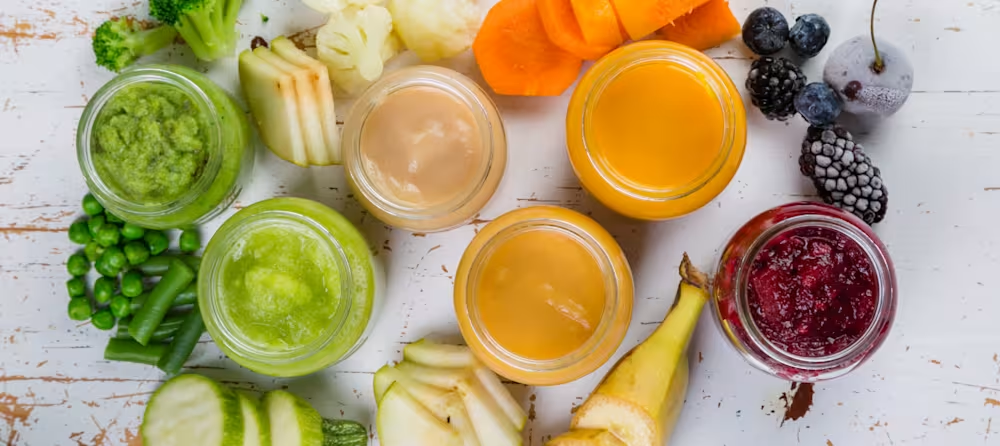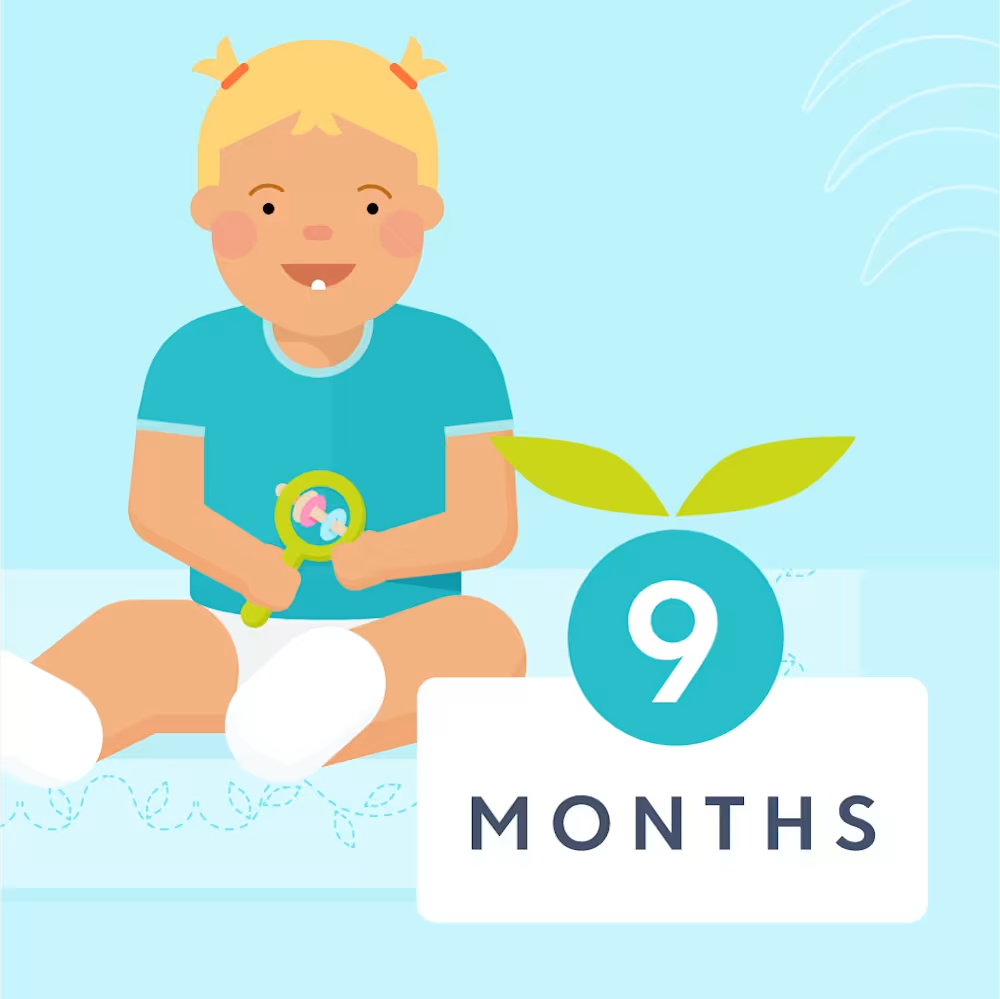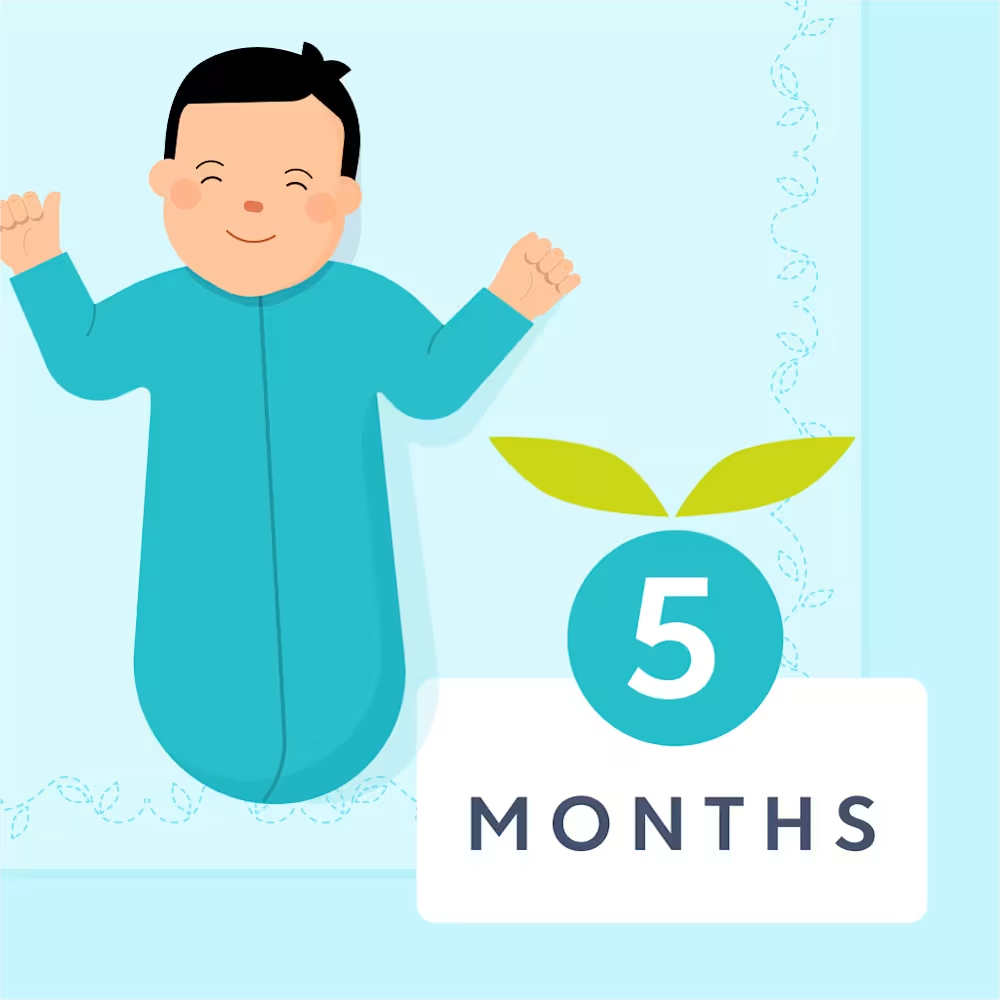6 month old feeding schedule: Amounts, food chart, formula, breastmilk
Updated Jan 02, 2026

The feeding adventure takes an exciting turn around 6 months! While all babies will still get most of their nutrition from breastmilk or formula until age 1, many babies are ready to dip their toes into the world of solid foods. From first tastes to messy discoveries, this stage can be full of surprises.
Keep reading to learn everything you need to know about feeding your 6 month old, including sample feeding schedule, common feeding challenges, and tips to navigate it all with a little bit of ease.
6 month old baby sample feeding schedule
Your baby’s schedule may vary based on their individual needs as well as the needs of your family. The following schedule is meant as a sample guide, not a strict plan.
Time of day | Feeding type |
6:30 AM | Nurse or bottle (wake up) |
9:00 AM | Nurse or bottle, followed by solids |
1:30 PM | Nurse or bottle |
4:30 PM | Nurse or bottle |
6:30/7:00 PM | Nurse or bottle (before bed) |
How much to feed a 6 month: Food chart
You may choose to introduce solids in the form of or — or both. Either way, your baby may start with one meal a day and continue to work up to adding more meals and snacks as they move toward one year of age.
When considering what makes up a “meal” at this age, start with 1 - 2 foods at a time. Solids for 6 month olds are all about exploration. Most babies will eat small amounts at this age. This may look like:
1 - 2 tbsp of purees
a few bites of food served baby-led weaning style
As exciting as starting solids is, your baby still replies on milk as their primary nutrition. You can expect your little one to:
Eat about 4 - 6 breast milk or formula feeds a day
Total roughly 24 - 32 oz of breast milk or formula per day
Possibly decrease their milk intake as they eat more solids over time
As long as your baby is growing well and having about 6 wet diapers a day, your baby is getting enough to eat. Here are two examples of how to schedule breast milk and/or formula feeds alongside baby-led weaning and/or purees.
Baby-led weaning
Time of day | Feeding |
Wake-up: | Breast milk or formula |
Breakfast mid-morning: | Breast milk or formula |
Lunch: | Breast milk or formula Example: Chicken breast (served in strips), avocado strips, and banana strips |
Mid-afternoon: | Breast milk or formula |
Dinner: | Breast milk or formula |
Before bed: | Breast milk or formula |
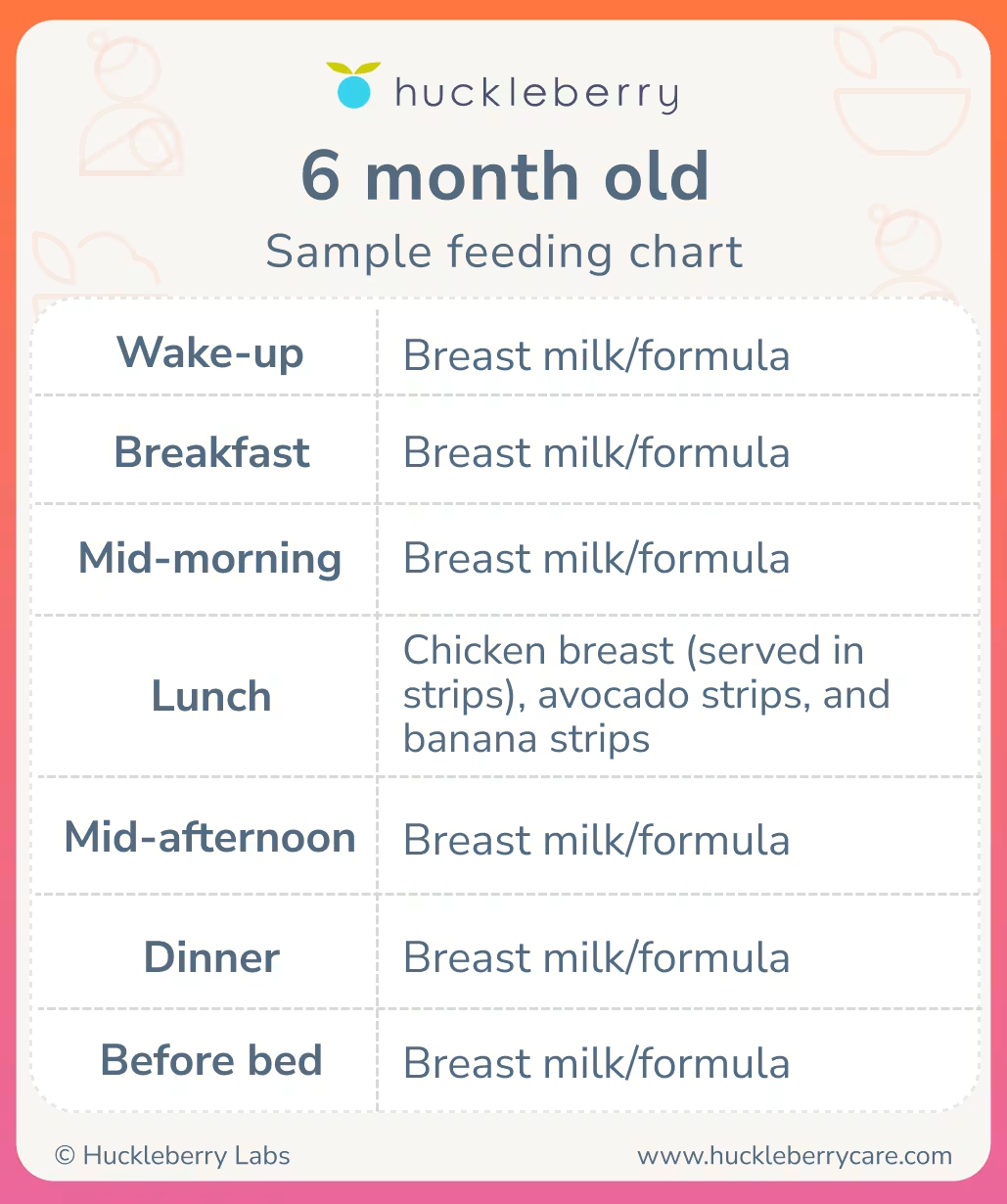
Purees
Time of day | Feeding |
Wake-up: | Breast milk or formula |
Breakfast mid-morning: | Breast milk or formula |
Lunch: | Breast milk or formula Example: Black bean, avocado, or banana puree |
Mid-afternoon: | Breast milk or formula |
Dinner: | Breast milk or formula |
Before bed: | Breast milk or formula |
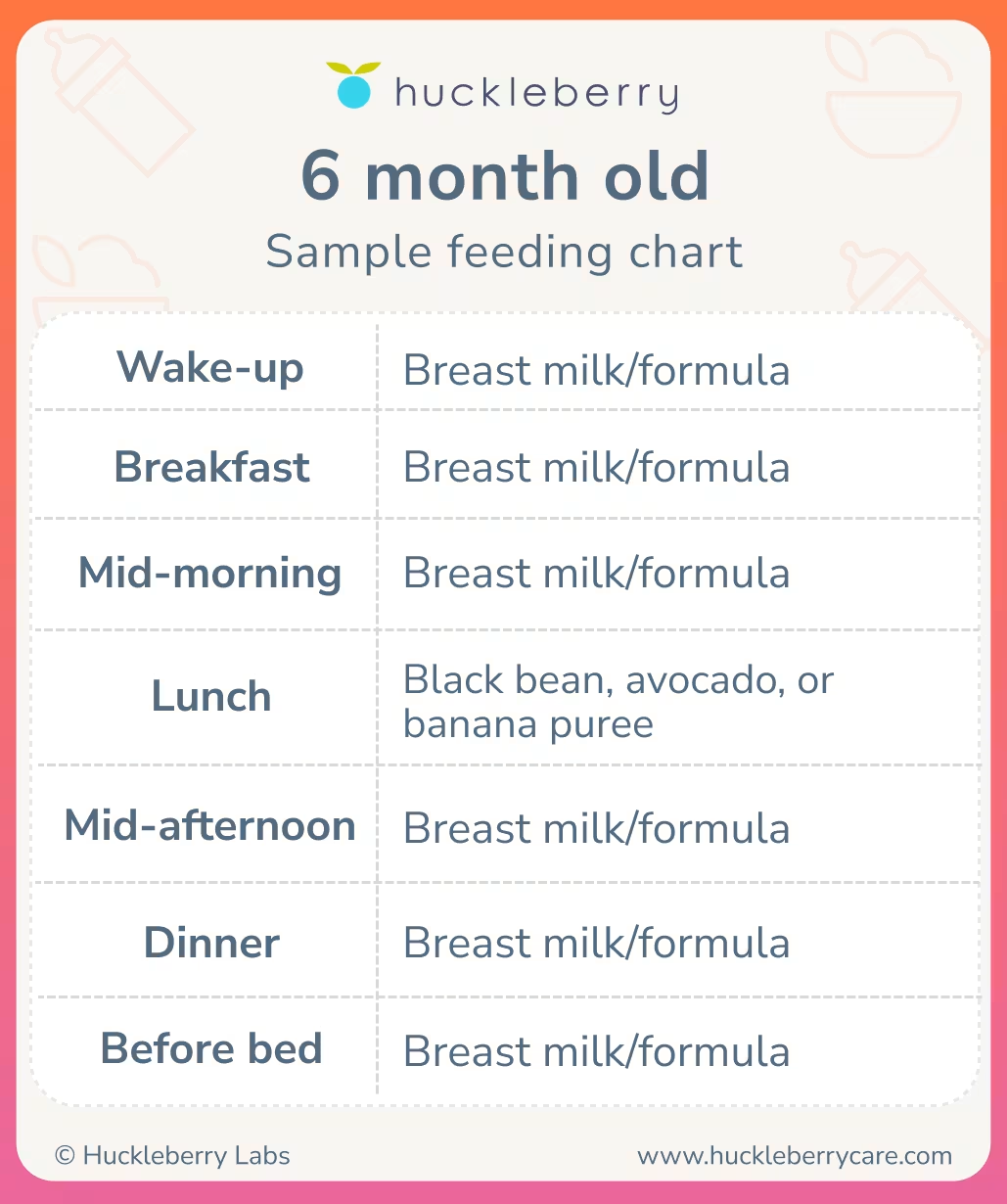
Night feedings at 6 months old
Many babies can sleep for longer stretches through the night at this age, but it is common for babies to still have 1 - 2 night feedings. If your baby wakes up hungry, go ahead and feed them as you normally would. However, unless directed to by your pediatrician, there is no need to wake a baby to feed them at this age.
Feeding challenges for a 6 month old baby
Around 6 months, babies are transitioning to solids while still nursing or taking bottles. It’s a learning curve for you both, and it’s normal if things feel messy and unpredictable at first. This period brings excitement — and a few common feeding hurdles.
Textures and flavors can take time to accept when adjusting to solids
Gumming or spitting out food happens as they learn to chew and swallow safely
might feel stressful, but it is a normal part of your baby learning how to eat
Appetite fluctuations are normal
Watch for allergic reactions or sensitivities to new foods
Short attention span during meals is frustrating, yet typical
7 tips for feeding your 6 month old baby
Tip | Notes |
Keep liquid feeds the same | Breastmilk and formula remain the main sources of nutrition at this age. Small amounts of water can be introduced around 6 months. |
Use hunger and fullness cues | Follow your baby’s hunger and fullness cues for both milk and solids. Feeding patterns may temporarily shift during teething or illness. |
Check for signs of readiness before beginning solids | Wait until your baby can sit with minimal support, has good head and neck control, can bring objects to their mouth, and shows interest in food before offering solids. |
Start slow with solids | Begin with one solid meal per day and let your baby explore food through play. There’s no rush to increase amounts — this stage is about learning and discovery. |
Ensure baby is safe when eating | Always feed in a supportive high chair and supervise closely. Serve foods in safe sizes and textures to prevent choking. |
Focus on priority nutrients | Include iron-, zinc-, and protein-rich foods, along with healthy fats, to support your baby’s growth and development. |
Introduce allergens early and often | Introduce allergens (peanuts, eggs, and dairy) early and repeatedly, unless advised otherwise by your pediatrician, to help reduce allergy risk. |
Tip #1: Keep liquid feeds the same
Your baby will gradually decrease their intake of breastmilk and formula over time, but right now they are still the main source of nutrition for your baby. Stick with the same amounts to start, and follow your baby’s cues for when to reduce the amount (usually this gradual change comes a few months later). Also, in small amounts starting around 6 months.
Tip #2: Use hunger and fullness cues
Feed your baby according to their hunger and fullness cues, whether they are nursing, taking a bottle, or eating solid foods. Also note that feeding patterns may briefly change if your baby is uncomfortable due to a cold,, etc.
Tip #3: Check for signs of readiness before beginning solids
Your baby should be able to sit with minimal support, bring objects to their mouth, have good head and neck control as well as show an interest in food before beginning solid foods [].
Tip #4: Start slow with solids
Babies at this age will want to explore and play with their food – this helps them learn! There’s no rush for them to eat large amounts of solid food at this age, so take it slow and offer about one solid meal per day.
Tip #5: Ensure baby is safe when eating
Babies should be fed in a well-supported high chair and never be left alone []. Food should be served in the right .
Tip #6: Focus on priority nutrients
Priority nutrients for this age group include iron, zinc, protein, and other. Be sure to include solid foods with these nutrients in their diet.
Tip #7: Introduce allergens early and often
The latest research [] shows introducing high-risk allergen foods, eggs, and dairy may help lower the occurrence of food allergies. Unless advised otherwise by your pediatrician, introduce these foods early and often.
Takeaway: Feeding 6 month olds
Challenges are normal: Feeding at 6 months is exciting, but can also be challenging. Your baby is still relying on breastmilk and/or formula, so stick with your usual feeding amounts and frequencies.
It's about exploration at this age: Start with 1 – 2 foods at a time, whether purees or baby-led weaning. Small amounts, like a few bites or 1 – 2 tablespoons, are normal and all about exploration. Remember, this stage is about gradual exploration, not getting perfect nutrition at every meal.
Babies’ appetites can fluctuate: It’s normal for them to gum or spit out new foods as they develop the muscles to chew and swallow safely.
Take it at your own pace: Introducing solids is a big change for both you and your baby. Take it slow and remember you are both learning about this new phase of feeding.
Share article:
Note: The content on this site is for informational purposes only and should not replace medical advice from your doctor, pediatrician, or medical professional. If you have questions or concerns, you should contact a medical professional.
5 Sources
Share article:


